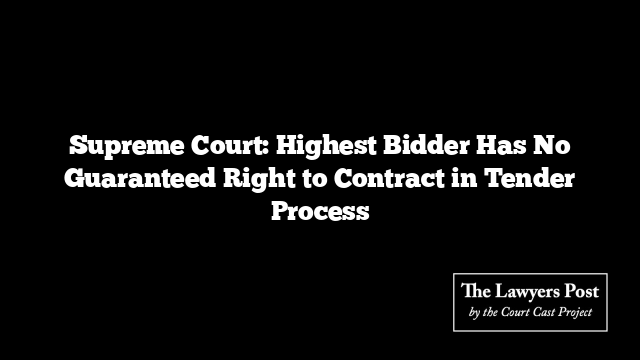In a landmark ruling, the Supreme Court clarified that the highest bidder in a tender process does not automatically acquire a vested right to have the auction concluded in their favor. The Court emphasized that the issuance of an allotment letter is essential for the execution of a contract.
The case stemmed from a dispute between the Indore Development Authority (IDA) and the Humud Jain Samaj Trust over a land lease tender. The appellant, IDA, contested a High Court directive to award the contract to the Trust after its bid of ₹25,671.90 per square meter was the highest in the auction.
The tender, issued in July 2020, had a reserve price of ₹21,120 per square meter. The Trust’s bid was initially considered, but the IDA’s Tender Evaluation Committee found an unpaid property tax of ₹1.25 crore on the land, prompting the cancellation of the original process. The IDA then reissued a new tender with a revised reserve price of ₹26,000 per square meter. Rather than participate in the new process, the Trust approached the High Court, arguing that as the highest bidder, it should automatically be awarded the contract.
While the Single Bench of the High Court dismissed the Trust’s petition, a Division Bench ruled in its favor, compelling the IDA to award the contract. The IDA then appealed to the Supreme Court.
The Supreme Court, in overturning the High Court’s decision, affirmed that simply placing the highest bid did not entitle the bidder to the contract. The judgment referenced the case of Haryana Urban Development Authority v. Orchid Infrastructure Developers Pvt. Ltd. (2017), which affirmed that the government or its agencies retain the right to reject the highest bid in the public interest, particularly when considerations like revenue generation are at stake.
The Court also noted that since no allotment letter had been issued, there was no binding contract between the parties. The IDA had validly exercised its discretion to reject the bid based on substantial grounds, including tax liabilities and the potential for greater future revenue. The ruling concluded that the Division Bench had overstepped by effectively modifying the tender conditions and ordering a contract award.
The appeal was allowed, reinforcing the principle that the highest bid does not guarantee a contract and that tendering authorities have the right to make decisions based on public interest and financial considerations.





